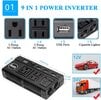@iraghav what laptop do you have?
I would recommend looking at this forum thread:
Advice on 12V inverter to 120V for Laptop - posted in Equipment (No astrophotography): Hello All, I had a bad experience with 12V DC laptop adapter killing the mainboard of my Dell laptop (I can tell more about that story if folks want), so my decision for field powering the laptop is 12V...

www.cloudynights.com
I put a summary of interesting points, see below:
1) The user had bad experience with 12V DC laptop adapter.
- I suppose using a 12V to 19V step up DC converter, maybe something like this one:
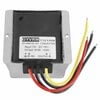
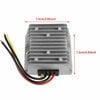
2) Someone recommend getting a specific car adapter provided by the laptop manufacturer. Such as the following Dell:
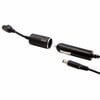
The item on the left is an "Airplane Adapter"
The item on the right is the "Car Adapter"
- In the Forum thread, someone provides the following information:
Dell has a tiny axial pin inside the power plug which is digitally transmitting parameters of the power adapter.
Only when a certified adapter is detected the laptop allows it to charge the battery. (Actual laptop operation is un-affected).
The above model seems to have some issue with that pin and blew the little transistor in the receiver circuit on the mainboard.
Thus preventing the battery from charging ever again (which you see in the bios 'power' menu).
I only realized that when I had tried the adapter on two laptops.
Dell placed the communication transistor on the mainboard (and not on a separate charge controller).
So blowing that one transistor kills the whole MB. Cost me 2 new MBs and replacement work.
3) A less worrysome option but not as efficient would be using a 12V DC / 120V AC inverter and the Laptop charger:
I personaly use the following inverters

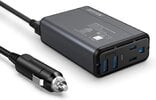
Note: Inexpensive inverters output
square waves rather than
sine waves and some equipment won't like that.
Many laptops will work with an inexpensive square-wave inverter, but for maximum compatibility and safety
you probably want a good pure sine wave inverter. They are a little bit more expensive, but recommended.
4) If you are a DIY person, the following youtube video is quite explanatory:










